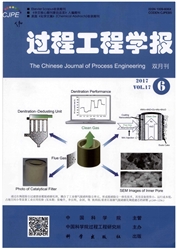

 中文摘要:
中文摘要:
研究了影响污水处理厂剩余污泥热处理厌氧发酵产氢的4个因素:热处理时间、污泥浓度、起始pH和反应瓶顶隙率.结果表明,热处理时间会影响污泥热处理的效果,导致发酵产氢的底物-污泥不同,从而影响热处理污泥的发酵产氢,121℃下热处理5min为最佳处理时间.中性起始pH值(6.5~8.0)下,热处理污泥的氢产率相对稳定,低于6.5不利于发酵产氢.当反应瓶的顶隙率为51.61%时,热处理污泥的氢产率最大.7.81g/L为最佳污泥浓度,该浓度下污泥的氢产率最大,高于或低于该浓度时,污泥的发酵氢产率均下降.在最佳条件下,热处理污泥的氢产率达19.57mL/gVSS.
 英文摘要:
英文摘要:
Four influential factors of fermentative hydrogen production from thermally treated sewage sludge were investigated, including thermal treatment time, sludge concentration, initial pH and headspace rate of reactor. The performance of thermally treated sludge was affected by the treatment time, which resulted in different substrates for fermentative hydrogen production. And 5 rain at 121 was optimal for high hydrogen yield, but longer treatment t℃ime than that was negative. The highest hydrogen yield of thermally treated sludge occurred in the initial pH value range of 6.5~8.0. The value less than 6.5 was unfavorable. The headspace of reactor at 51.61% was optimal for hydrogen yield from thermally treated sludge by batch experiment. The highest hydrogen yield occurred at the sludge concentration of 7.81 g VSS/L. The optimal hydrogen yield of thermally treated sludge was 19.57 mL/g VSS.
 同期刊论文项目
同期刊论文项目
 同项目期刊论文
同项目期刊论文
 Craig Adams . Determination of endocrine disrupting chemicals in the liquid and solid phases of acti
Craig Adams . Determination of endocrine disrupting chemicals in the liquid and solid phases of acti Optimized coagulation on a municipal wastewater treatment: Competitive and synergetic effect among d
Optimized coagulation on a municipal wastewater treatment: Competitive and synergetic effect among d Online investigation on ozonation products of pyrene and benz[a]anthracene particles with a vacuum u
Online investigation on ozonation products of pyrene and benz[a]anthracene particles with a vacuum u Comparison of archaeal and bacterial community structures in heavily oil-contaminated and pristine s
Comparison of archaeal and bacterial community structures in heavily oil-contaminated and pristine s Effects of calcium ions on surface characteristics and adsorptive properties of hydrous manganese di
Effects of calcium ions on surface characteristics and adsorptive properties of hydrous manganese di Study of a combined heterotrophic and sulfur autotrophic denitrification technology for removal of n
Study of a combined heterotrophic and sulfur autotrophic denitrification technology for removal of n Determination of optimum operating conditions for production of polyhydroxybutyrate by activated slu
Determination of optimum operating conditions for production of polyhydroxybutyrate by activated slu Removal of endocrine disrupting chemicals during ozonation of municipal sewage with brominated by-pr
Removal of endocrine disrupting chemicals during ozonation of municipal sewage with brominated by-pr Christopher WK Chow. Enhanced coagulation for high alkalinity and micro- polluted water: The third w
Christopher WK Chow. Enhanced coagulation for high alkalinity and micro- polluted water: The third w Change of bacterial communities in sediments along Songhua River in Northeastern China after a nitro
Change of bacterial communities in sediments along Songhua River in Northeastern China after a nitro Design of BDD-TiO2 Hybrid Electrode with P-N Function for Photoelectroatalytic Degradation of Organi
Design of BDD-TiO2 Hybrid Electrode with P-N Function for Photoelectroatalytic Degradation of Organi Relative importance of hydrolyzed Al(III) species during coagulation with PACl: A case study with th
Relative importance of hydrolyzed Al(III) species during coagulation with PACl: A case study with th Effect of liquid property on adsorption and catalytic reduction of nitrate over hydrotalcite-support
Effect of liquid property on adsorption and catalytic reduction of nitrate over hydrotalcite-support Effect of preozonation on the characteristic transformation of fulvic acid and its subsequent trichl
Effect of preozonation on the characteristic transformation of fulvic acid and its subsequent trichl Proportion of bromo-DBPs in total DBPs during reclaimed-water chloration and its related influencing
Proportion of bromo-DBPs in total DBPs during reclaimed-water chloration and its related influencing Characterization and Reactivity of MnOx Supported on Mesoporous Zirconia for Herbicide 2,4-D Mineral
Characterization and Reactivity of MnOx Supported on Mesoporous Zirconia for Herbicide 2,4-D Mineral Simultaneous determination of sulfonamides, tetracyclines and tiamulin in swine wastewater by solid-
Simultaneous determination of sulfonamides, tetracyclines and tiamulin in swine wastewater by solid- Abundance and community composition of methanotrophs in a Chinese paddy soil under long-term fertili
Abundance and community composition of methanotrophs in a Chinese paddy soil under long-term fertili Microwave electrodeless lamp assisted catalytic degradation of X-GRL with manganese dioxides: Adsorp
Microwave electrodeless lamp assisted catalytic degradation of X-GRL with manganese dioxides: Adsorp Synergistic effect and mechanism between SO2 and NO 2 in their adsorption and reaction on gamma-alum
Synergistic effect and mechanism between SO2 and NO 2 in their adsorption and reaction on gamma-alum Nitrobenzene biodegradation ability of microbial communities in water and sediments along the Songhu
Nitrobenzene biodegradation ability of microbial communities in water and sediments along the Songhu Removal of disinfection by-products precursors by polyaluminum chloride coagulation coupled with chl
Removal of disinfection by-products precursors by polyaluminum chloride coagulation coupled with chl 期刊信息
期刊信息
